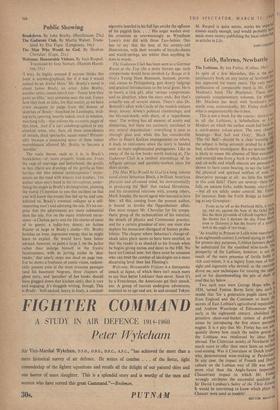Public Showing
'I WILL be highly amused if anyone thinks this book is autobiographical, for if it was I would indeed be an Awful Mess.' Mr. Bratby's novel is about James Brady, an artist. John Bratby, another artist, comes into it too--`funny how they paint so alike,' says someone near the end. Funny how they look so alike, for that matter, as we have every occasion to judge from the dozens of sketches of Brady‚ÄĒhunched on Lambretta, trail- ing tarts, spewing, heavily naked, stuck in window, watching telly‚ÄĒthat enliven the eccentric pages of this book. And if it isn't autobiographical in any absolute sense, why, then, all these coincidences of initials, thick spectacles, squab noses? Presum- ably because a reassuring sense of these minor resemblances allowed Mr. Bratby to become a 'novelist.'
The main theme, such as it is, is Brady's breakdown‚ÄĒor, more properly, break-out. From the cage of marriage and fatherhood, the gorilla in him (there are drawings of the gorilla in him) lurches out into animal inconsequence: exper- iences on the road with whores and lunatics. The author takes one's hand in his throughout, under- lining the stages in Brady's disintegration, pointing the moral ('1 mention to you this incident so that you will know the events that led up to, and con- tributed to, Brady's eventual collapse as a self- respecting man') and adorning the tale. It's no sur- prise that the adornments are more substantial than the tale. For on the many irrelevant excur- sions--a Chelsea party and the life-stories of some of its guests; a teddy-boy dance; an Action Painter at large in Brady's studio--Mr. Bratby lavishes an irate, ingenuous energy that he might learn to exploit. He would have been better advised, however, to paint a large L on the jacket rather than indulge himself in the frantic facetiousness, with its jarring asides to 'dear reader,' that nearly stops one dead on page two. For he shows a freshness of comic vision, endemi- cally present even in the most tiresome passages (and his basement Negroes, three chapters of ghost story, and 'parodies' of hot books should have glugged down that kitchen sink), that is rare and engaging. It's thuggish writing, though. This is Brady : 'bull-necked, heavy in body, a constant cigarette inseried in his full lips amidst the ugliness of his piggish face. . . .' His anger washes over his creations as overweeningly as Wyndham Lewis's ever did with those Tarr-babies. One has to say that the best of his seventy-odd illustrations, with their wreaths of bicycle-chains and watch-springs, are wittier than anything he does in words.
The Gadarene Club has been seen as a German Room at the Top. (ln a more literate age, such comparisons would have invoked Le Rouge et le Noir.) Young Hans Beumann, hesitant, provin- cial, comes to Philippsburg, gets dreary lodgings and gradual introductions to the local great. He-is to marry a rich girl, after various compromises and an abortion, when the story ends. But that's actually one of several stories. There's also Dr. Benrath's affair with Cecile of the modish antique shop; lawyer Alwin's political clamberings; and the life-and-death, with diary, of a 'superfluous man.' The writing has all manner of acuity and distinction, but these are curiously unrelated to any central organisation : everything is seen as through glass and, while this has considerable effect in Hans's Kafkan impingements on others, it leads to restiveness when the story is handed over to more sophisticated protagonists. Like so many of the so few books worth looking at, The Gadarene Club is a random assemblage of in- telligent apercus and partially-worked ideas for
short stories. ‚ÄĘ The Man Who Would be God is a long, solemn novel about Sebastian Bloch, a brilliant American physicist and all-round mind, his instrumentality in producing the 'Bolt' that rocked Hiroshima, and his tormented relations with, among others, Mark Ampter, the secret agent who learned to love him : all this, coming from the present author, is bound to invoke the Oppenheimer affair. One must respect Mr. Chevalier for his sympa- thetic grasp of the technicalities of his material, the details of physics and Communist practice, and for a certain grandeur of aim; one must also deplore his insouciant disregard of human proba- bilities. The chapter where Sebastian's change-of- ideals takes place seems to have been omitted, so that the reader is as shocked as his friends when he begins giving names and dates to the FBI. We have no Conrad now, but there must be someone who can treat the combat of ideologies on a more discerning level than Ian Fleming's.
Welcome, Honourable Visitors is a therapeutic smack at Japan, of which there isn't much more to say than better Linklater than never. Since it's_ by a Frenchman, the Americans get their smack, too. A group of tourists undergoes adventures, assorted as to age and sex, in and around Tokyo.
M. Raspail is quite astute, works his expected ironies neatly enough, and would probably hayte made more money publishing the local colour hi¬į as articles in Life.
JOHN COLENO










































 Previous page
Previous page